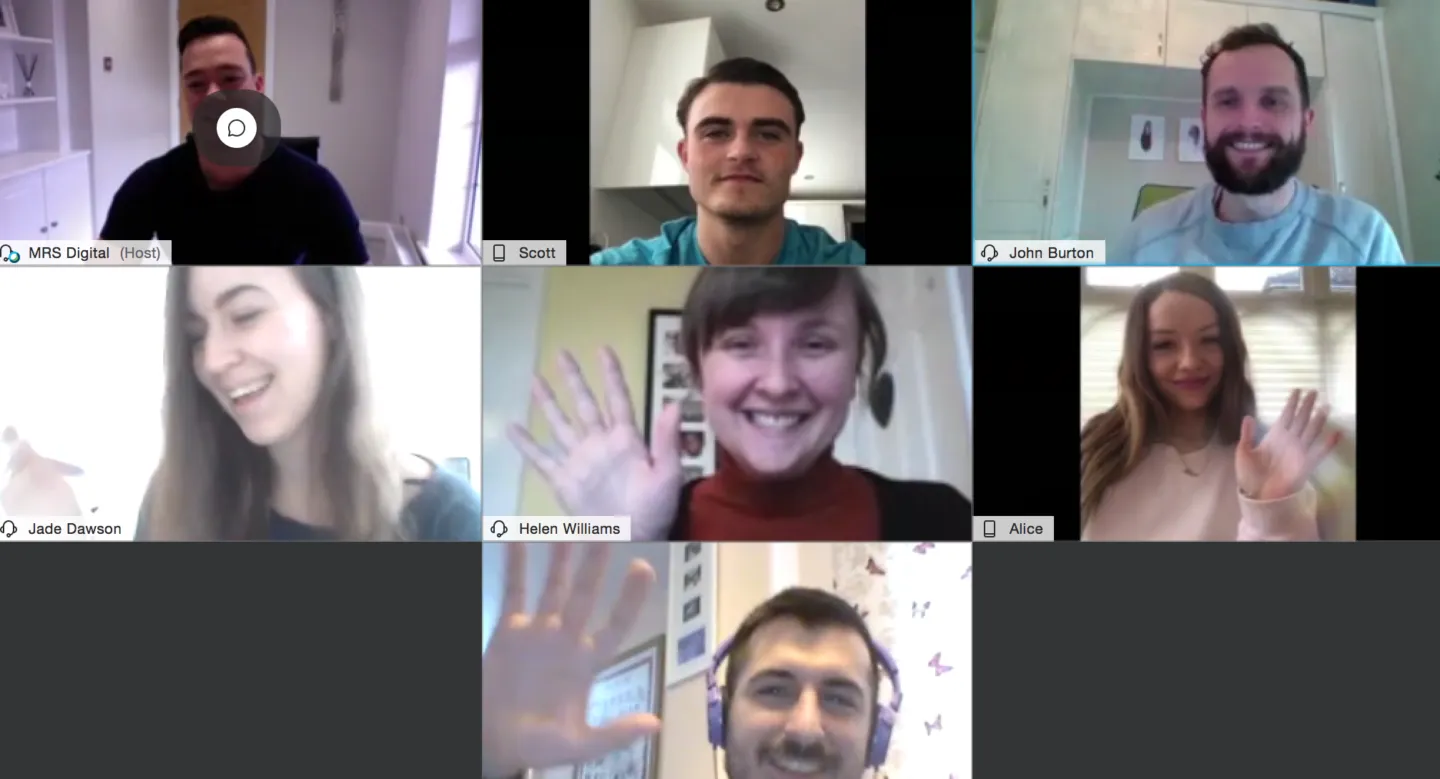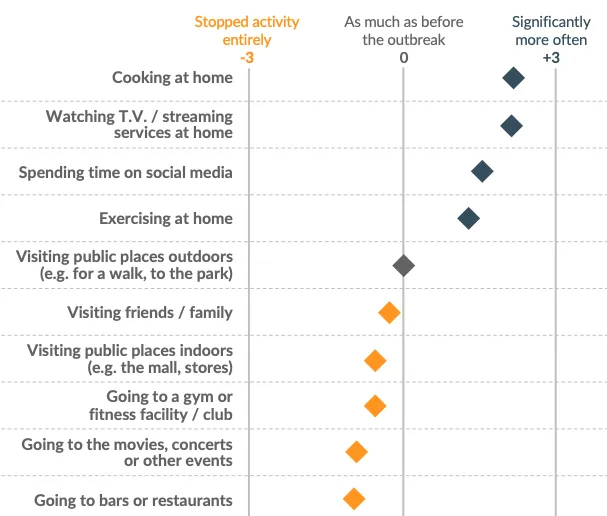In this blog we help highlight some of the key factors that marketers and business owners should be considering right now. We don’t have all the answers, but we can provide you with some guidance on how to approach your marketing in the coming days and weeks.
Above All Else: Follow Government Advice
As of 24th March 2020, in the UK the government have declared that individuals can only leave their homes for four reasons;
- To attend work if it’s absolutely necessary
- To shop for essentials including food and medicine
- To exercise outside once a day
- For medical needs such as appointments and caring for vulnerable people

In a work environment, this means that everybody should be working from home wherever this is possible.
The advice given by the UK government is put into place as a means of protection, and the entire population has a responsibility to follow the advice given.
Redefining Marketing During the Coronavirus
The primary aim for every business during this difficult time is to achieve some kind of business continuity, as best as possible. Businesses have already faced difficult decisions in the past week and more are sure to come.
Businesses must not only consider the here and now, but plan for the mid- to long-term. That means maintaining the functions essential to running a successful business, including marketing. As long as there remains a demand for your product or service in some form then a level of sales and marketing activity is required to capture that demand.
There’s no telling how long the coronavirus crisis will last, but it will end. Those companies that have managed to sustain a level of marketing during COVID-19 will be in a far better position to prosper once again, after the period has passed. There are predictions that when the crisis subsides the economy will see a rapid bounce back. You do not want to be left behind when this time comes.
According to the US Small Business Administration, companies earning more than $1 million (£847,790 at the time of writing) annually should be spending a minimum of 7% of gross revenue on advertising and marketing, in order to maintain a healthy position. So, while it might not be feasible to increase spend and grow your marketing, sustaining what’s in place should be considered, where possible, to protect your market position.
While budget spent on creating or serving immediate demand, such as paid advertising, may require reduction, spend on longer-term marketing, such as SEO and content marketing, should be continued as much as possible.
Are Your Third Party Providers Still Going Strong?
If you work with a marketing agency, get in touch as soon as possible to find out if they are still operating at full capacity. Are all their team members still able to work to deliver the service your company needs? If not, you need to think about how to tackle this.
Find out if your agency can be responsive to your needs right now. There is no place for sitting still right now and you want to be confident that the team responsible for your marketing can do what needs to be done, even if this means taking actions that would not be considered the norm for them.
There are no hard and fast guidelines relating to how to market during this unpredicateble period, so the most effective stance is to be adaptable. Your agency needs to look at what’s working and what’s not on a day to day basis, and act accordingly.
If you’ve determined that your marketing agency can no longer perform the tasks you need them to, it’s time to consider your options. As drastic as it sounds, now may be just the time to consider working with a partner more capable of meeting your business needs.
Make Sure Your Marketing Team is Making the Most of its Time
Budget cuts might mean your marketing staff don’t have the same workload as they usually would. If marketing budgets have been cut, or events have been cancelled, you might find yourself with members of staff who are asking for work. These employees are a valuable resource that can be utilised for other tasks, so make the most of them in your marketing contingency plan. There are other ways that they can be channelling their productivity for the benefit of the company. Additional, alternative work for your marketing teams could include:
- Build and nurture on social media – social media marketing is easy to neglect, but now is the time to be showing it, and your target audiences, some love
- New, or responsive email marketing campaigns – especially in consideration of Coronavirus updates
- Blog or evergreen content writing for your website or printed materials
- Think tank meetings to come up with fresh marketing ideas to put in place when the outbreak has passed
- Customer retention activities – depending on your sector and business size, this could be sending letters, personal emails or making calls to abate people’s fears
- The creation of videos and webinars to extend to your customers
- Performing internal analytics audits on your website(s) and social media

Dealing With Changing Consumer Behaviour
Right now, special attention should be given to consumer behaviour. It is unsafe to assume how potential customers will act during this time.
Consider the fact that a significant proportion of people are suddenly going to have a great deal of free time. While everyone is likely to face personal budget cuts, money will still be spent. E-commerce sites are likely to see a spike in visitors, because people who are buying will have more time to research. This also means they will be less likely to impulse buy.
Instead of going with your gut, use all the tools in your arsenal to keep track of how your target market is responding to the crisis. Keeping track of searcher behaviour via Google Ads or SEO tools will provide a great deal of insight on this front. Especially in B2B environments, a reduction in purchases doesn’t necessarily mean there are less people researching your offering. It could be they are simply deferring purchasing decisions.
With this in mind, are there ways that your company can capture from said window shoppers, or even capitalise on a higher demand if it increases? If you offer a product or service that there is an increased need for during the COVID-19 crisis, think about how to increase awareness of that product. Some examples of creative marketing during coronavirus have included:
- Facebook Portal – In light of the new governmental policies asking people to stay at home as much as possible, Facebook have been smart in their advertising of the Facebook Portal. This equipment connects to a television screen or other device, and allows users to video call each other on a big screen. Advertising has included images of families using the Portal to have dinner together, and celebrate birthdays together.
- When the COVID-19 outbreak was at its earlier stages in the UK, toiletry company lush advertised that they would allow – and encourage – passers-by to wash their hands in their high street shops

Source: searchengineland.com
How To Adapt Your Online Presence
You need to assess all the messaging you currently have online, and make changes that acknowledge the effects of the coronavirus outbreak. Here are some practical things you can change in your online communications and search presence:
- Add a banner to every page of your site, detailing the status of your business at this time. For example, this could be ‘business as usual’, ‘sorry for delays in responses’, or ‘expect longer delivery times’.
- Check all your existing advertising and make sure it is current and considerate of the current situation. For example avoid any mention of spending time with loved ones and friends during this time when people have been advised not to.
- Consider using new schema mark up on your sites. Schema.org have fast-tracked the release of structured data that indicates time-sensitive announcements, such as relating to events and special announcements. Learn more about using schema mark up.
- Update your Google my Business with any new information, such as revised opening hours, alternative contact details, or adding posts containing any other updates to your company.
What To Do About PPC
Among the various areas that a marketing budget is spent, PPC advertising is one which is likely to be considered first if a company needs to cut spend during this time. Before making hasty decisions regarding PPC, in your marketing contingency plan, consider the following.
PPC accounts should be assessed on a case by case basis
Good practice is to ensure that your budget and attention on PPC is driven by the demand for your services, at any given time. If your customers are still purchasing, even on a smaller scale, then you want to capture that demand. Make sure that your PPC team or agency have a budget strategy that can effectively scale with demand.
Think about the long-term
It’s also important to think about life after the COVID-19 crisis has passed. It’s true that your audience might delay purchasing decisions, meaning your conversion rate falls, but filling your lead funnel now may give you an invaluable head start when the world returns to business as usual. Think about how you can nurture leads now and close them efficiently in the future.
Undertake competitor research
Consider your competitors. Customer demand may fall, but your competitors might be making drastic decisions with their budgets when it comes to PPC marketing during COVID-19. This could mean drops in Cost Per Click (CPC) fall, giving you an opportunity to gain good business on a lower budget. Keep an eye on your target keywords and act accordingly.
Be sensitive
There is much debate surrounding the ethics behind a company’s marketing during coronavirus, especially if it looks as though a company is trying to profit from such a crisis. As this is such a trying time for every individual, it’s important to be considerate and sensitive in your advertising – including on PPC landing pages. Do not tap into people’s fear and catastrophise the circumstances, instead show expertise and sophistication in order to instil a sense of reassurance.
Keep an eye on the PPC landscape
With every day comes new developments when it comes to marketing during coronavirus, many of which are vital to they way in which PPC advertising is implemented. Over recent weeks we have seen the following changes:
- Google is concealing any ads that reference COVID-19 or relating terms, so steer clear of this language in your keywords, copy, and creative designs.
- Conversion rates for many companies are dropping, possibly because those who have clicked through are taking more time to make a decision on their purchase – because they have more time to research at home.
- Industries with high demand right now, such as toiletries and office supplies, are seeing higher CPCs, impressions and conversions
- Those with low demand, such as spas and beauty products, have a lower CPC. These have decreased by between 14-20%
What to Do About SEO
Budget spent on SEO activity is one of the last areas you should consider cutting.
SEO is a long-term investment that has a long-term impact
It’s no secret that SEO is a long-game. Investing time in this area of marketing now is likely to have significant positive effects in the future. Businesses that can sustain a consistent, or improved level of SEO during this crisis period will certainly gain an advantage in the longer-term.
SEO activities can be planned months in advance
The best way to set about putting in place an effective SEO strategy in your marketing contingency plan, at this time, is to think about how it can be front-loaded. Put plans and schedules into place early on, so that if operations face difficulties – such as limited staff – in the future, your company is prepared. If programs allow it, have content scheduled to go live at staggered dates across the coming weeks and months.
Your SEO performance will improve as others drop
Businesses that choose to continue spending budget on their SEO will likely notice a significant increase in engagement, as it becomes apparent that other companies have cut their spend. As competitors lose momentum, your company will grow in visibility if you have continued to optimise your digital presence.
SEO work can be adapted
The good news is, much SEO work can be carried out by staff working remotely. as more employees are asked to work from home, your SEO positions should not take a hit.
If other areas within a company’s marketing have had their budgets cut, it might be that there are available staff who can assist in your SEO activities. Use this opportunity to have your marketers work on supplementary content and optimise older content, that may have been neglected over time.
If you aren’t sure how to implement marketing changes right now, we may be able to help you for free until you’re back up and running as normal. Get in touch with us today






